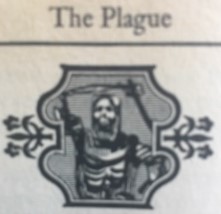Plague Journal, Dying For Love
 I am revisiting passages in The Plague by Albert Camus. I am interested in lynch pin ideas which Camus presents through his characters. In this passage is conversation is held between Rambert, a Paris journalist trapped in plague infested Oran, Dr. Bernard Rieux, the surgeon who is the narrator, and Jean Tarrou, the best friend of Rieux whose journals are used as part of the chronicle. Rambert is intent on finding a way out of the locked down city to join his love, who waits for him.
I am revisiting passages in The Plague by Albert Camus. I am interested in lynch pin ideas which Camus presents through his characters. In this passage is conversation is held between Rambert, a Paris journalist trapped in plague infested Oran, Dr. Bernard Rieux, the surgeon who is the narrator, and Jean Tarrou, the best friend of Rieux whose journals are used as part of the chronicle. Rambert is intent on finding a way out of the locked down city to join his love, who waits for him.
Sitting on the bed, the journalist seemed to be studying his fingernails. Rieux was gazing at his squat, powerfully built form, hunched up on the edge of the bed. Suddenly he realized that Rambert was returning his gaze.
“You know, doctor, I’ve given a lot of thought to your campaign. And if I’m not with you, I have my reasons. No, I don’t think it’s that I’m afraid to risk my skin again. I took part in the Spanish Civil War.”
“On which side?” Tarrou asked.
“The losing side. But since then I’ve done a bit of thinking.”
“About what?”
“Courage. I know now that man is capable of great deeds. But if he isn’t capable of a great emotion, well, he leaves me cold.”
“One has the idea that he is capable of everything,” Tarrou remarked.
“I can’t agree; he’s incapable of suffering for a long time, or being happy for a long time. Which means that he’s incapable of anything really worth while.” He looked at the two men in turn, then asked: “Tell me, Tarrou, are you capable of dying for love?”
“I couldn’t say, but I hardly think so, as I am now.”
“You see. But you’re capable of dying for an idea; one can see that right away. Well, personally, I’ve seen enough of people who die for an idea. I don’t believe in heroism; I know it’s easy and I’ve learned it can be murderous. What interests me is living and dying for what one loves.”
Rieux had been watching the journalist attentively. With his eyes still on him he said quietly:
“Man isn’t an idea, Rambert.”
Rambert sprang off the bed, his face ablaze with passion. “Man is an idea, and a precious small idea, once he turns his back on love. And that’s my point; we, mankind, have lost the capacity for love. We must face that fact, doctor. Let’s wait to acquire that capacity or, if really it’s beyond us, wait for the deliverance that will come to each of us anyway, without his playing the hero. Personally, I look no farther.”
Rieux rose. He suddenly appeared very tired. “You’re right, Rambert, quite right, and for nothing in the world would I try to dissuade you from what you’re going to do; it seems to me absolutely right and proper.